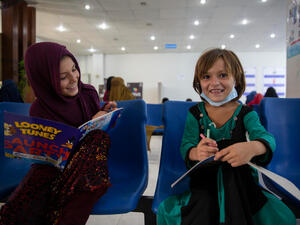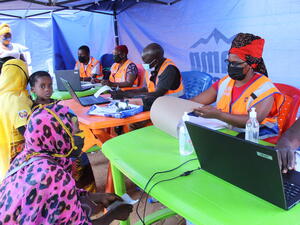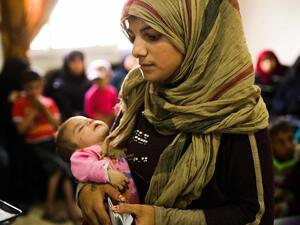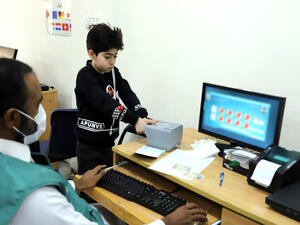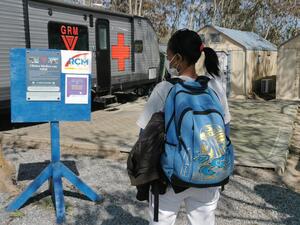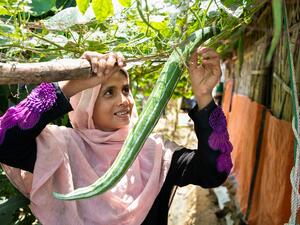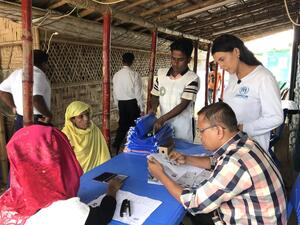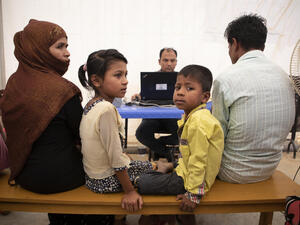Mobile, mach-speed registration for Afghans in Pakistan
Mobile, mach-speed registration for Afghans in Pakistan

A UNHCR staff member in a mobile registration van checks Rahim Udin's name against the 2005 census database.
MACH, Pakistan, November 7 (UNHCR) - Tall and distinguished-looking in a turban and grey beard, Rahim Udin was trying to keep a straight face while his friends and relatives teased him as he posed for a rare photograph.
The 60-year-old patriarch was sitting for a portrait in a mobile registration van in this remote town, and a crowd had gathered outside, curious to see what this registration of Afghans was all about.
The government of Pakistan started its 10-week registration of Afghan citizens on October 15 at some 100 registration centres run by the National Database and Registration Authority. Mobile registration vans are used to support these centres in far-flung areas with small Afghan populations - like Mach in the south-western province of Balochistan.
Last year's census in Pakistan counted 145 Afghans living in this area, who by origin are Afghan Arabs and Mughals from the northern Afghan province of Faryab.
Faryab native Rahim Udin was the first to approach the registration van parked outside a hospital in Mach. The day-rate general labourer and his family of 10 were processed and received Proof of Registration (PoR) cards recognising them as Afghan citizens in Pakistan.
"I have spent 24 years in Pakistan without any legal documents," Udin said. "Of course I'm pleased to have the PoR cards for my entire family. In my town, I never had any problems with the local authorities or people, but I could not move freely out of town without any identity documents."
Like his fellow compatriots, Udin was hopeful that the card would mitigate the problems faced by some of the estimated 2.4 million Afghans currently living in Pakistan.
The pace of registration in Mach picked up through the first day, with people keen to get their cards during the three days the mobile team was due to stay in the town. Noor Muhammad approached the van with his wife Sahib-Jamala, who was shuffling in a traditional blue burqa, and seven children. He helped them into the van, then followed himself.
After spending 30 minutes in the vehicle, he jumped out smiling and holding his PoR card. His six-year-old son clung happily to his own card, refusing to surrender it to his father. His wife, too, received a card with her photograph, a mandatory feature that met with resistance among some Afghan families in the beginning.
Afghans in Mach had refused to register until a man named Kochar took a first step and let his wife uncover her face. He told everyone proudly, "I was the first one in Mach who let his wife take her photo for the card, and now all those who initially refused to bring their females for registration are bringing them."
He explained, "Our people always wait for others to take a step. Once someone takes that step, the entire community follows."
More than 136,000 Afghans have so far been registered throughout Pakistan, including above 33,000 in Balochistan. The province hosts the second-largest Afghan population in the country, after North-West Frontier Province.
Registration has been completed in seven of Balochistan's districts, while mobile registration vans are supporting the exercise in less populated areas like Punjgor, Lasbela and Kharan until mid-November.
The exercise will continue in the province's remaining 11 districts until the end of December. UNHCR and the government's Commissioner for Afghan Refugees are jointly supporting and monitoring the process.
By Duniya Khan in Mach, Pakistan

